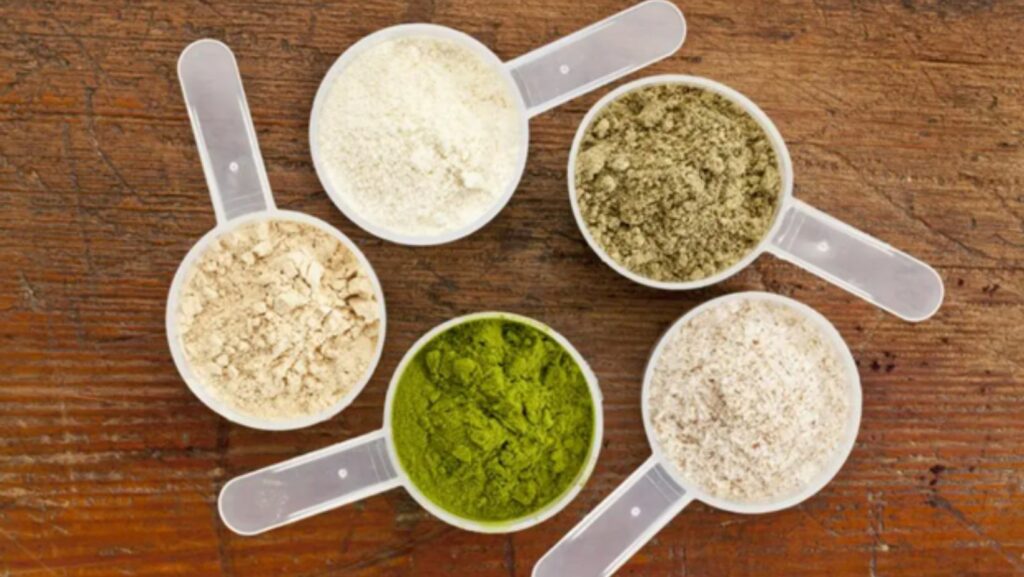
In a perfect world, we’d all be carefully tracking our macros and cooking meals that perfectly meet our needs three times a day. However, the truth is that many of us lead a busy lifestyle that often involves grabbing meals on the run, making it difficult to get the right kinds of nutrients in our diets. Protein is one example.
Often referred to as the body’s building block, protein is essential for developing and maintaining tissues such as muscles, skin, hair, and organs. However, it does more than that. Protein is also necessary for the synthesis of energy, immunological response, hormone control, and a healthy metabolism. Simply said, consuming the proper amount of protein can help you achieve optimal health and look.
Using protein powders is an easy and practical approach to up your protein intake. One scoop combined with your daily cereal or mixed into a smoothie, can supply around 20 to 25 grams of easily absorbable protein. But with the range of protein powders available, it’s crucial to know how to make the right selection.
Understanding the Different Types of Protein Powder
The first step in choosing the right protein powder supplement for you is getting to know a bit about the different types:
Whey Protein
Whey is derived from cow’s milk. Being highly absorbable and having a great amino acid content, it is among the best sources of protein out there. Moreover, whey contains all nine of the essential amino acids needed for proper bodily function, making it a “complete” protein. Whey’s ability to help build muscle is further enhanced by the high concentration of leucine, the necessary acid it contains.
Whey Concentrate
Whey protein has several subtypes. Whey concentrate is considered the lowest-quality alternative because it has a limited refining process. About 80% pure protein is found in concentrates, while certain products have even lower percentages.

Carbs and fat make up the balance of the nutritional composition. This results in an increased calorie content, which may be an issue if you’re trying to find a powder that doesn’t interfere with your diet.
Whey Isolate
A product must contain 90% or more protein to be classified as whey isolate. This thorough refining and concentrated purity makes whey isolate the go-to form of protein powder for the majority of athletes. Plus, isolates have fewer calories than the majority of other alternatives.
Whey isolate also has a lower lactose content due to its decreased carbohydrate content, which is extremely advantageous if you have any dietary limitations.
Casein
The other protein in cow’s milk is called casein, and it’s mostly used to make cheese. Because of its slow-acting digestive qualities, bodybuilders have started using it before bed. Compared to whey protein, casein digests significantly more slowly.
Bodybuilders take casein protein before bed to facilitate a gradual release of amino acids during the night, as opposed to going through a prolonged period of fasting.
Pea
Containing an average of 60-75% protein, pea protein is considered one of the best types of plant-based protein available. Because it lacks the same amounts of EAAs as whey and other animal-based protein powders, this vegan protein powder used to be considered of inferior quality.

But that has been changed by modern technology. For instance, research has shown that Ingredient Optimized ioPea Protein is equally effective as whey protein powder in terms of building muscle.
Soy
As a complete protein, soy powder is another excellent choice to think about if you are going plant-based. A typical supplement of this kind contains 90% of protein. But be aware that soy also contains phytoestrogens. When phytoestrogens are used extensively, testosterone may fall, and estrogen may rise. This might not be the best option if you are a male looking to put on muscle.
Rice
As a complete protein source, rice protein provides your body with all nine necessary amino acids required for normal muscle growth and development. These amino acids improve overall body composition, support the development and repair of muscle tissue, and preserve immune system function.
The protein composition of rice protein encourages feelings of satisfaction and fullness, which can help reduce overall calorie intake and support weight reduction goals.
Hemp
Hemp is a complete protein that is suitable for vegans. It contains all 20 amino acids and omega-3 fatty acids too. It is rare to find a vegan protein with a full amino acid profile, which makes this one unique. It blends nicely with water and has a nutty flavour. Worth a try if you lead a vegan lifestyle.
Consider your Dietary Goals and Preferences
Your goals and needs will also help you choose the right protein powder.

Muscle Building and Recovery
- Whey protein isolate: Because of its quick absorption and high protein content, it’s great for post-workout recovery.
- Casein protein: Offers a gradual and continuous release of amino acids, which makes it perfect for muscle recovery at night.
Weight Loss
- Whey protein concentrate encourages lean muscle building, which aids in satiety and promotes weight loss.
- Pea protein: Because it’s low in calories and carbs, it can be a good choice for people on a diet.
Vegetarians and Vegans
- Soy protein: provides a full spectrum of amino acids and is a favorite among vegans and vegetarians.
- Pea protein: Plant-based and free of allergies, it’s a great substitute for those who can’t eat animal products.
Specific Dietary Restrictions
- Rice Protein: this option is suitable for anyone with celiac disease or gluten sensitivity because it is hypoallergenic and gluten-free.
- Hemp Protein contains omega-3 fatty acids and is safe for people who are allergic to soy or dairy products.
Read the Label
Take a close look at the protein powder ingredient list to be sure there are no unnecessary ingredients, preservatives, or added sweeteners.

Some products may include artificial flavors or sweeteners, which might not be in line with your health plans—especially if you have an allergy. If you want something with a sweet taste, look for one that contains natural sweeteners.
In addition to its protein content, examine the protein powder’s whole nutritional profile. Seek for products that offer extra vitamins, minerals, and other necessary nutrients. Remember that certain mixes include harmful oils, which can lead to bodily inflammation.
If you find it difficult to pronounce the name of an ingredient, consider looking for another choice. And if the product includes more than 10 ingredients, chances are it isn’t a good one.











